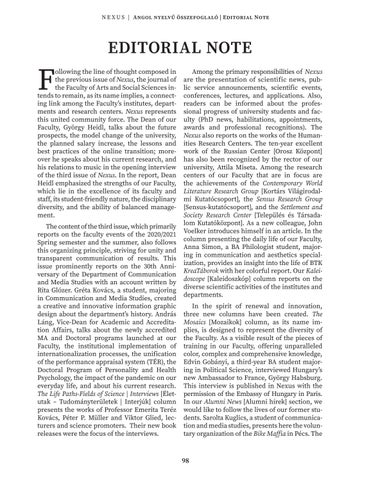N E X U S | ANGOL NYELVŰ ÖSSZEFOGLALÓ | EDITORIAL NOTE
EDITORIAL NOTE
F
ollowing the line of thought composed in the previous issue of Nexus, the journal of the Faculty of Arts and Social Sciences intends to remain, as its name implies, a connecting link among the Faculty’s institutes, departments and research centers. Nexus represents this united community force. The Dean of our Faculty, György Heidl, talks about the future prospects, the model change of the university, the planned salary increase, the lessons and best practices of the online transition; moreover he speaks about his current research, and his relations to music in the opening interview of the third issue of Nexus. In the report, Dean Heidl emphasized the strengths of our Faculty, which lie in the excellence of its faculty and staff, its student-friendly nature, the disciplinary diversity, and the ability of balanced management. The content of the third issue, which primarily reports on the faculty events of the 2020/2021 Spring semester and the summer, also follows this organizing principle, striving for unity and transparent communication of results. This issue prominently reports on the 30th Anniversary of the Department of Communication and Media Studies with an account written by Rita Glózer. Gréta Kovács, a student, majoring in Communication and Media Studies, created a creative and innovative information graphic design about the department’s history. András Láng, Vice-Dean for Academic and Accreditation Affairs, talks about the newly accredited MA and Doctoral programs launched at our Faculty, the institutional implementation of internationalization processes, the unification of the performance appraisal system (TÉR), the Doctoral Program of Personality and Health Psychology, the impact of the pandemic on our everyday life, and about his current research. The Life Paths-Fields of Science | Interviews [Életutak – Tudományterületek | Interjúk] column presents the works of Professor Emerita Teréz Kovács, Péter P. Müller and Viktor Glied, lecturers and science promoters. Their new book releases were the focus of the interviews.
Among the primary responsibilities of Nexus are the presentation of scientific news, public service announcements, scientific events, conferences, lectures, and applications. Also, readers can be informed about the professional progress of university students and faculty (PhD news, habilitations, appointments, awards and professional recognitions). The Nexus also reports on the works of the Humanities Research Centers. The ten-year excellent work of the Russian Center [Orosz Központ] has also been recognized by the rector of our university, Attila Miseta. Among the research centers of our Faculty that are in focus are the achievements of the Contemporary World Literature Research Group [Kortárs Világirodalmi Kutatócsoport], the Sensus Research Group [Sensus-kutatócsoport], and the Settlement and Society Research Center [Település és Társadalom Kutatóközpont]. As a new colleague, John Voelker introduces himself in an article. In the column presenting the daily life of our Faculty, Anna Simon, a BA Philologist student, majoring in communication and aesthetics specialization, provides an insight into the life of BTK KreaTáborok with her colorful report. Our Kaleidoscope [Kaleidoszkóp] column reports on the diverse scientific activities of the institutes and departments. In the spirit of renewal and innovation, three new columns have been created. The Mosaics [Mozaikok] column, as its name implies, is designed to represent the diversity of the Faculty. As a visible result of the pieces of training in our Faculty, offering unparalleled color, complex and comprehensive knowledge, Edvin Gobányi, a third-year BA student majoring in Political Science, interviewed Hungary’s new Ambassador to France, György Habsburg. This interview is published in Nexus with the permission of the Embassy of Hungary in Paris. In our Alumni News [Alumni hírek] section, we would like to follow the lives of our former students. Sarolta Kuglics, a student of communication and media studies, presents here the voluntary organization of the Bike Maffia in Pécs. The
98
